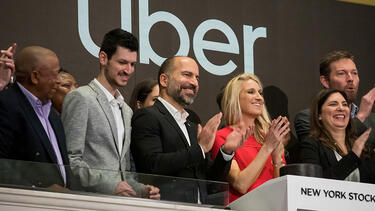Faculty Viewpoints
Why ‘Breaking Up’ Big Tech Probably Won’t Work
Instead, argues Yale SOM’s Fiona Scott Morton, the government should exercise its regulatory powers to promote competition.

The Bahrain Conference: What the Experts and the Media Missed
Yale SOM's Jeffrey Sonnenfeld says the positive nature of discussion at the recent economic summit in Bahrain was a welcome sign of new optimism in the region.

Is Making an Impact the Path to Profit?
According to Prof. Henrietta Onwuegbuzie of Lagos Business School, entrepreneurs focused on solving problems and ongoing innovation grow their businesses faster, make more money—and have a bigger impact than any government or nonprofit.

With FCA-Renault-Nissan Drama, Who Needs Game of Thrones?
The proposed merger between Renault and Fiat Chrysler would create the world's third-largest automaker and could reshape the future of electric and self-driving cars. But Yale SOM's Jeffrey Sonnenfeld writes that the merger is a fundamentally human drama.

Don’t Be Surprised by Uber’s Low-Priced IPO—It’s a Sign of Challenges to Come
According to Yale SOM’s Matthew Spiegel and Heather Tookes, an IPO is often followed by disappointing returns, not just for the newly public company but its entire industry.

A Life in Finance: A Conversation with Prof. Roger Ibbotson
Professor Roger Ibbotson, an influential scholar and practitioner of finance for decades, sat down for a conversation with Professor William Goetzmann about his groundbreaking work on the historical returns of the stock market, his experiences as a teacher, and his current research.

Think Biden and Trump Are Too Old for the White House? Take a Look Around.
Yale SOM’s Jeffrey Sonnenfeld points to research on the strengths of older people and the accomplishments of politicians and business leaders in their 60s, 70s, and 80s.

Can the Microcredit Model Be Improved?
Studies suggest that the long-term impact of microfinance is limited. Yale SOM’s Mushfiq Mobarak and the University of Chicago’s Vikas Dimble write that the much-touted policy tool can help more people by modifying and extending its model.

Tesla’s Turbulence Musk Be Explained
Yale’s Jeffrey Sonnenfeld argues that Elon Musk’s recent performance demonstrates that he doesn’t get the importance of fulfilling expectations.

A Frustrating and Illuminating Process: Global Network Experts Discuss the State of Brexit
A panel of experts from the Global Network for Advanced Management discussed the prolonged, contentious Brexit process and what the future likely holds for businesses and citizens with ties to Britain.
